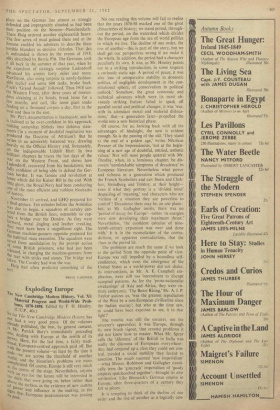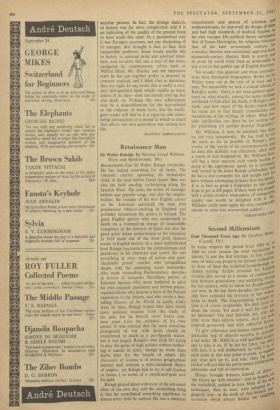Exploding Europe
The New Cambridge Modern History, Vol. XI:
lems, 1870-1898. Edited by F. H. Hinsley.
fio • Here, for the last time, a fairly tradi- ev■Ith the signPsower and influence in the making, in the So far The New Cambridge Modern History has 11Z, had a very good press. Of the volumes ais,a,°Y Published, the best, by general consent, Nwer _' nal, European-centred approach paid off. But ql4litlhe centre of the stage. Nevertheless, anyone v:Indl-Iwe are across the threshold of another co-r-', and the historian's problems are more the shifts an eye for the future will be interested in aLts shifts that were going on, below rather than of°°ve the surface, in the evidence of new centres its pe:11ciat European predominance was passing ,,MPlicated. Of course, Europe is still very much 'le, dealing with Europe at the zenith of its 'Ir. Patrick Bury's immediately preceding
Material Progress and World-Wide Prob- Present volume—at least by the time it
No one reading this volume will fail to realise that the years 1870-98 marked one of the great climacterics of history; we stand poised, through- out the period, on the watershed which divides the European age from the era of world politics in which we live. The decline of one order, the rise of another—this is part of the story, but we shall get our perspectives wrong if we make it the whole. In addition, the period had a character peculiarly its own. It was, as Mr. Hinsley points out in a striking introduction, in some respects a curiously static age. A period of peace, it was also 'one of comparative stability in domestic politics, of negligible development in the con- stitutional sphere, of conservatism in political outlook.' Somehow, the great economic and technical advances which were its most ob- viously striking feature failed to spark off parallel social and political changes; it was 'war, with its attendant moral and material disloca- tions,' that—a generation later—propelled the world into a new historical phase.
Of course, for us, looking back with all the advantages of hindsight, the new is evident enough. So is the passing of the old. 'They stand at the end of a golden age,' writes Nikolaus Pevsner of the Impressionists, 'not at the begin- ning of a new age of doubtful, untried, wsthetic values.' Nor will most people quarrel with Mr. Thorlby, when, in a luminous chapter, he dis- covers 'unmistakable symptoms of decadence' in European literature. Nevertheless what power and richness in a generation which produced the French Symbolists and saw Ibsen and Chek- hov, Strindberg and Tolstoy, at their height— even if what they portray is a 'divided mind' despairing of 'meaning,' and characters who are 'victims of a situation they are powerless to control'! Decadence there may be, on one plane: but, as Mr. Gallagher insists, there was no `period of decay for Europe'—rather 'its energies were now developing their maximum thrust.' Nevertheless, 'the confident calculus of nine- teenth-century expansion was over and done with.' It is in the reconcilation of the contra- dictions, or apparent contradictions, that the clues to the period lie.
The problems are much the same if we look at the period from the opposite point of view. Europe was still impelled by a boundless self- confidence, which even the emergence of the United States as a world-power did not shake; its interventions, as Mr. A. E. Campbell em- phasises, were still too intermittent to disrupt accepted patterns. As for the `proto-nationalist awakenings' of Asia and Africa, they were en- tirely embryonic. 'The Boxer Rising,' Mr. A. J. P. Taylor assures us, 'was the greatest repudiation of the West by a non-European civilisation since the Indian mutiny'; but who at the time saw, or could have been expected to see, it in that light?
The trouble was still the sorcerer, not the sorcerer's apprentice; it was Europe, through its own brash vigour, that created problems it did not know how to master. What Mr. Spear calls the 'dilemma' of the British in India was really the dilemma of Europeans everywhere: they had conjured up a class they could not con- trol, created a social mobility they feared to sanction. The much vaunted 'new imperialism' —what Messrs. Robinson and Gallagher causti- cally term the 'gimcrack' imperialism of 'gaudy empires spatchcocked together'—brought its own retribution. Like Bismarck's German empire in Europe, after three-quarters of a century they fell to pieces.
It is tempting to think of the decline of one order and the rise of another as a logically con- secutive process. In fact, the strange dialectic of history was far more complicated, and it is an indication of the quality of the present book to have made this clear. In a paradoxical way it was Europe's successes, not any slackening of its energies, that brought it face to face with insuperable problems. Some would ascribe this to hubris, to spirittial pride and spiritual blind- ness; and certainly this was a trait of the times, castigated by contemporary critics such as Wilfrid Blunt. Mr. Hinsley and the impressive team he has got together prefer to proceed by concrete analysis, and I think that as historians they are right. In any event, this is really a very, very distinguished book which—unlike so many
others of its class—does not merely sum up, but also leads on. Perhaps this very achievement may be a disqualification for the lazy-minded or the collector of brute facts; but the intelli- gent reader will find in it a vigorous and stimu- lating introduction to a period in which so much that affects our own generation was stirring into life.
GEOFFREY BARRACLOUGH











































 Previous page
Previous page